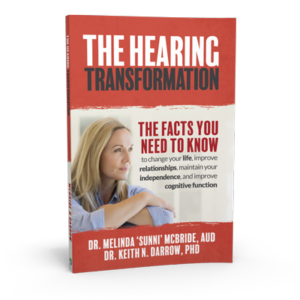Hearing loss is linked to health conditions that can affect not only your well-being but also your life span. If you have a hearing loss, here is what you should know so you can be the happiest, healthiest you.
Your Balance
In a study published in JAMA, individuals with at least a mild hearing loss (25 decibels) lost their balance and fell more often than those with healthy hearing. There was an additional increase in the odds of a fall as hearing loss worsened; falls were about 1.4 times as likely for each 10-decibel increase in hearing loss.
The effects of hearing loss may mean that more brainpower is devoted to hearing than to balance. Posture and body control require brain activity that may be impaired due to hearing loss, throwing off a person’s balance. These distractions may increase the risk of falling.
According to the National Council on Aging (NCOA):
- Falling is the No. 1 cause of fatal and nonfatal injuries for older Americans.
- Falls threaten safety and independence, and they generate enormous economic and personal costs.
- Falls result in more than 2.8 million injuries treated in emergency departments annually, including over 800,000 hospitalizations and more than 27,000 deaths.
What You Can Do
Talk to Your Audiologist About Hearing Aids
In The Laryngoscope journal, researchers from the Washington University School of Medicine in St. Louis, Mo., found that they had better balance when using hearing aids compared to when they didn’t.
Senior author Timothy E. Hullar, a professor of otolaryngology, explains, “The participants appeared to be using the sound information coming through their hearing aids as auditory reference points or landmarks to help maintain balance.”
Ask Your Audiologist About Your Inner-Ear Health
Responsible for our body’s balance, the vestibular system in the inner ear could be causing hearing problems as well as stability issues.
Try These Easy Practices:
- Stand on one leg; hold for 30 seconds each side. If that becomes easy, try doing it on a less stable surface. As you improve, challenge yourself to do it with your eyes closed!
- Walk heel to toe. Take 20 steps forward, heel to toe. Then walk backward, with toe to heel, in a straight line.
- Do yoga. Yoga helps with balance, focus, movement, and coordination by helping you to master transitions and develop your strength.
Your Gender
A recent study done by Age and Ageing looked at hearing impairment alongside incident disability and all-cause mortality in older men. It found that when compared with unimpaired men, men who had both hearing and visual impairments had a greater risk of dying of any cause, whereas men who only had a hearing loss had a greater risk of dying from cardiovascular causes than others.
The study mentioned those with hearing impairments as having a greater difficulty being mobile (problems walking/taking stairs), difficulties with activities of daily living, and difficulties with instrumental activities of daily living.
Data from the 1999 to 2004 National Health and Nutrition Examination Survey found that hearing loss is 5.5 times more prevalent in men than in women. Male subjects who are white, older, and less educated faced significantly higher rates of hearing loss. In particular, those with high blood pressure and diabetes, as well as smokers of more than 20 years, are more likely to have a hearing loss.
What You Can Do
Being proactive about hearing loss and overall health could help decrease risks listed above.
- If you know someone with a hearing loss, try talking to them about hearing aids.
- If you know someone with a hearing loss, learn communication tips to help keep them engaged socially.
- Turn down distracting music.
- Pick a place with less background noise.
- Talk to them in the light so they can better read lips and gestures.
- Don’t repeat what you’re saying louder; say it in a different way and more slowly.
- Eat right. Foods rich in folate, magnesium, zinc, and omega-3 fats help hearing in different ways
Talk to Your Audiologist About Hearing Aids
A study done by the National Council on Aging (NCOA) found that those with untreated hearing loss were more likely to report depression, anxiety, and paranoia, and were less likely to participate in organized social activities compared to those who wear hearing aids.1
Your Diet
As mentioned above, different foods can help your hearing health. But let’s take it a step further, both literally and figuratively — getting in touch with your roots can also help establish healthy hearing and hearing habits. Regularly engaging in outdoor activities is wonderful for your social and mental well-being, and it’s great for your physical health, too. Gardening, in particular, is a wonderfully rewarding activity that takes you outside, keeps you active, and provides you with fresh, delicious food.
What You Can Do
We dug up four ways to help you get out and get growing:
- Visit your local gardening store to see what classes it offers.
- If it’s a rainy day and you still want to get outside, invite a friend along with you to explore your local nursery — and maybe even pick out a few plants!
- Join a community garden. This style of gardening is great if you don’t have much space in your own place. Each one is different, but many offer mentoring, specials on supplies, and other community-oriented events. If you don’t have a garden in your area, there are resources online to help get you started!
- Get involved at your local arboretum, or just go for a visit. Dedicated to preserving and protecting plants, it’s a great place to learn more about your local flora and, sometimes, fauna. Stay in touch online, or subscribe to its mailing list so you get all of the latest news
Not entirely sure what to grow? Try foods that are rich in folate. This B vitamin is proven to help prevent high-frequency hearing loss, which is the varying inability to perceive high-pitched sounds and consonants. Folate decreases the amount of the amino acid homocysteine in your blood by increasing the creation of red blood cells. Too much homocysteine causes hearing difficulty by reducing blood flow to the inner ear. Folate is also useful in preventing heart disease, stroke, and dementia.
Talk to Your Audiologist About Hearing Aids
If you have a hearing loss, you might miss out on hearing the neighborhood kids laughing across the fence, the buzzing of bees, or birds chirping. It’s these little moments that make the most of your experience outdoors. Hearing aids are so advanced now that they can adjust to your setting and help you hear sounds you didn’t even know you were missing.
Source:
1. Holmes, C. et al. Untreated Hearing Loss Linked to Depression, Social Isolation in Seniors. Seniors Research Group, The National Council on the Aging. Audiology Today. May 1999


